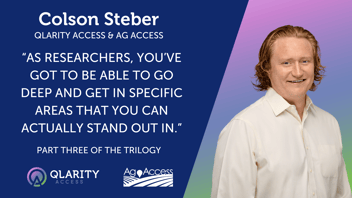
The Three Most Important Lessons We Learned in 2015
We learned quite a bit in 2015 here at Communications for Research (CFR). Like any business, we had our share of surprises, our challenges, our wins and losses. In fact, if a year goes by and we don’t feel that we have learned a lot, then that is something to be concerned about. We strongly believe in learning every chance we can and taking the good from every project. We are deeply appreciative to our clients for choosing to partner with us in their market research projects, and for allowing us to grow personally and professionally with each engagement. Below are our top three lessons learned in 2015.

Even small businesses must create specialties within their management group.
There’s a saying, “you can do anything, but you can’t do everything,” and that concept strongly applies to small businesses, or any kind of small business. In order to grow and thrive in a competitive market place, you need to be passionate and over-the-top confident about what you’re good at—and you can’t be good at everything. This applies to individuals, as well.
Within the CFR management team, we each realized we have our specialties and strengths. By focusing on what we’re truly great at, and allowing each other to run with projects within our specialties, we have aligned ourselves for success. A lot of small businesses start off by having everyone roll up their sleeves and do everything. In the beginning this often makes sense. Small teams have to be nimble and with resource challenges, it is often more efficient to have many people be able to do many tasks. Often these tasks lie outside their range of specialty or comfort.
In 2015, we learned to have the confidence and assurance to focus individually on what we each excel at. This meant having a lot of trust and confidence in the relationships within the management team, trusting that each other was making the right decisions, doing the absolute right things for the business. When we were able to step back from each other and let go, we created more efficiencies and were able to be more productive and move faster as a collective team.
Going ridiculously out of your way to engage someone and help them makes them loyal. This goes for customers and employees.
Loyalty goes a long way and working hard to create loyalty is something you will never regret. Every relationship is a give and take. We realized this year, that the more we give, the more we receive. This goes with mentoring and training employees, it goes for having compassion and sensitivity about what may be happening in an employee’s personal life outside of the office.
It also goes for over-servicing our clients and making sure we absolutely, always deliver. Most clients will notice this and will appreciate your hard work tenfold. And that means they will stick with you for a long time. They will recommend your services to others. Small businesses cannot quantify the value of loyal customers; it’s their lifeline. At CFR, we’ve learned that over-servicing and focusing on relationships does take time, but it creates mutual success in the end.
Teaching decision making is far more influential than telling someone what to do.
Teaching effective decision making begins with values, and finding the right employees with the right values. After all, we all rely on values to guide you through decision making in your day to day life. It makes sense to find employees who share the common values system as the overall business.
If you can find teammates that have the right values, then teaching decision making won’t be too difficult. At CFR we’ve learned that in order to grow, we have to delegate. Teaching effective decision making is part of that process of letting go and handing off the reigns to another employee with the total faith and confidence that they will do the right thing.
Teaching decision making goes beyond values in the sense that it forces an employee to logically think through different situations and scenarios. What would happen if one client decided to do XYZ? If this part of a research project failed, how would you approach it? If you don’t think you’ll be able to have the client deliverables by the required due date, what do you do? Decision making is a sequential, logical process and if you can help your team members think through decisions as you would, then the hand off to allowing them to take control is easier than you believe.
What are some lessons you’ve learned in your business this year? We love to hear from our clients—we appreciate the lessons they teach us. Thank you for a fantastic 2015.


